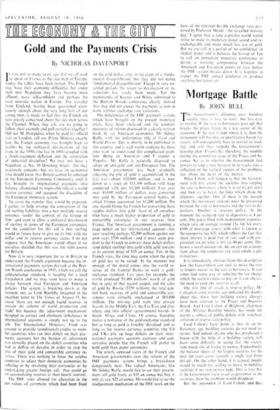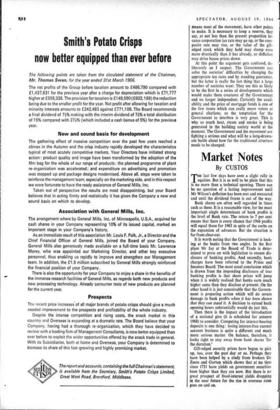Mortgage Battle
By JOHN BULL
rrilL Government's dilemma over building What I think will happen is that the Govern- ment will lirst cajole the societies into keeping the rate to borrower, where it is at 6.1 per cent) and then try to break the links which chain the dilemma together. One of these is the margin which the movement reckons must be preserved between the rate to borrowers and the rate to de- positors. Another is reserves policy. At the moment the standard rate to depositors is 4 per cent. The gap is filled with management expenses. which take on average around I Is. 6d. for every £100 of mortgage assets: with what is known as the composite tax bill. which reflects the fact that share interest is paid free of tax; and with cor- poration tax on what is left (at 40 per cent). This leaves a small amount (4s. 8d. on certain assump- tions about the composite tax rate) which is put to reserves.
It is immediately obvious from this description how the Government can seek to move the rate to lenders nearer to the rate to borrowers. It can either find some way of reducing the tax charge which the societies have to pay, or it can obviate the need to keep any reser%es at all.
1 he lirst line of attack is reserve policy. Mr Callaghan some months ago indicated his doubts about this. Since then building society charges have been referred to the Prices and incomes Board. And Lord Cohen of Brighton, chairman of the Alliance Building Society, has made the matter a subject of public debate with trenchant criticism of reserve ratio policy.
Lord Cohen's basic point is that in an in- flationary age. building societies do not need re- serves. And indeed anyone who has purchased a house with the help of a building society will have some difficulty in seeing that the society runs much risk of losing its money. Undoubtedly the balance sheets of the largest societies for the past ten years -carry scarcely a single scar from default. On the other hand, it is argued, people would he much less willing to invest in building societies it no reserve was kept. This is true but if the Government were to act as guarantor to the societies. then the prc,blem would disappear.
But the opponents of Lord Cohen, and that means most of the movement, have other points to make. It is necessary to keep a reserve, they say, at not less than the present proportion be- cause corporation tax rate may go up, or the com- posite rate may rise, or the value of the gilt- edged stock which they hold may slump even more drastically than it has already, or deflation may drive house prices down.
At this point the argument gets confused, de- liberately so I suspect. The Government can solve the societies' difficulties by changing the appropriate tax rates and by standing guarantor, but the latter is really the last thing that a large number of societies want. They see this as likely to be the first in a series of developments which would make them creatures of the Government and no longer independent. Certainly the avail- ability and the price of mortgage funds is one of the few issues which can really move voters at general elections, so the temptation for the Government to interfere is very great. This is why so much heat, steam and smoke is being generated in the building society world at the moment. The Government and the movement are fighting a serious and what will be a long-drawn- out battle about how far the traditional structure needs to be changed.































 Previous page
Previous page